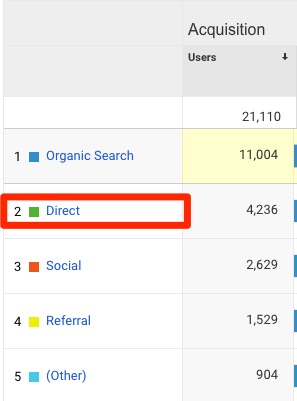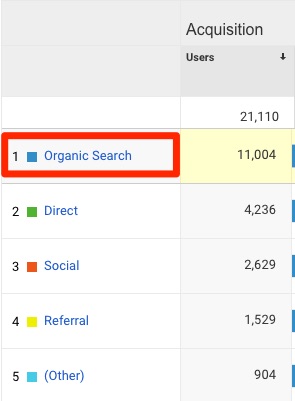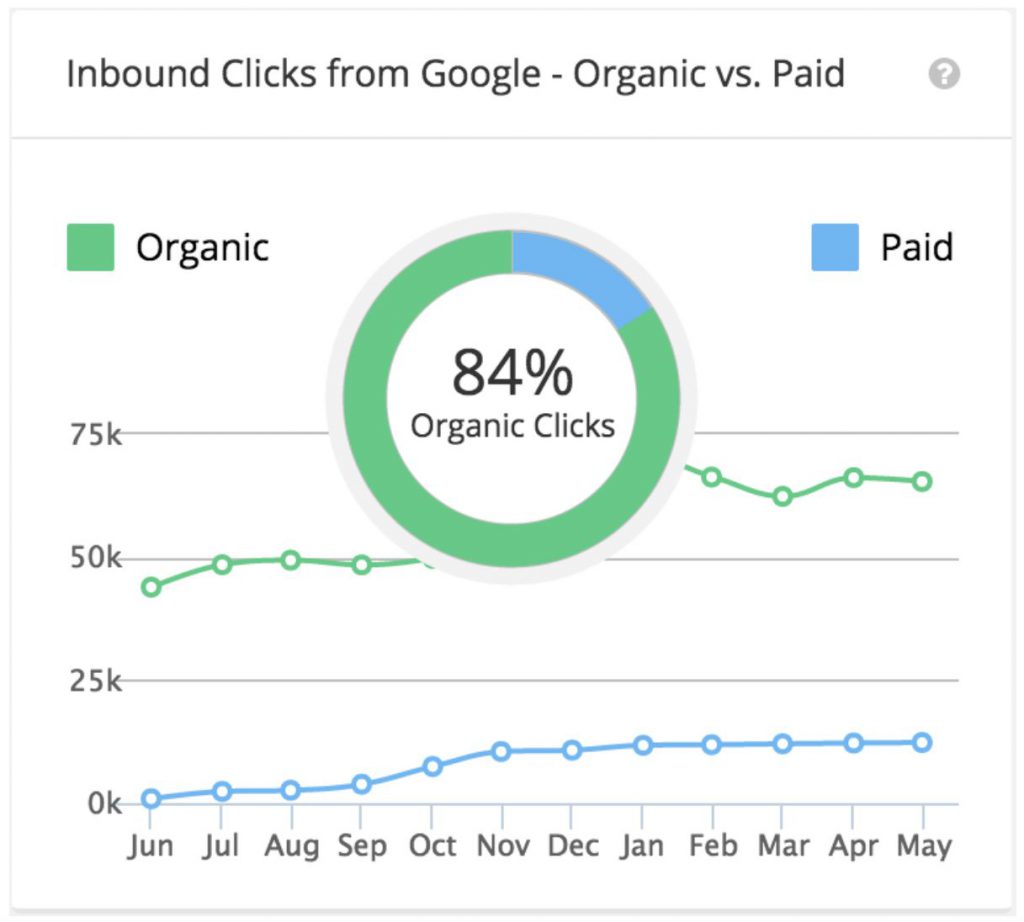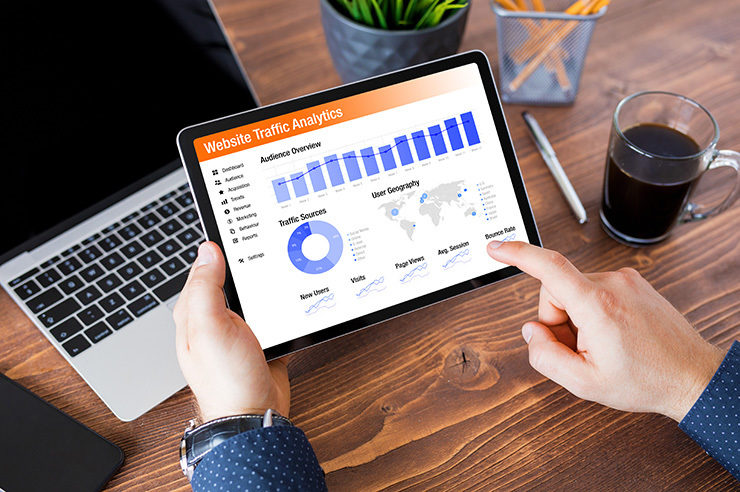Your website is the online home of your brand and central to the success of your business. Understanding who visits it, and how they got there, is an essential component of a comprehensive strategic plan for revenue growth.
Google Analytics is a great tool to help you determine how your visitors are finding your site. The key is understanding how your traffic sources are grouped and what they mean. Most of them are fairly self-explanatory, such as “Social” or “Email.” However, there is often confusion between organic and direct traffic.
Organic Traffic vs. Direct Traffic: The Basics
What is Direct Traffic?
When using Google Analytics to review the direct traffic to your website, it’s important to know that it groups site traffic as “direct” when it doesn’t have any data to show how the session got to your website. Essentially, when they can’t attribute the session to a traffic source, it is grouped under direct.

There are many reasons why traffic to your website would show up as direct traffic. Here are some examples:
- A URL to your site was manually entered
- An individual utilizes a bookmark in their browser to connect to your website
- Your website tracking codes aren’t firing right or are non-existent
- Someone clicks on an untagged link in an email
- An individual visited an HTTP site from a link to an HTTPS website
If you believe there are errors in the way Google Analytics calculates the direct traffic from your website, there are steps you can take to improve your data tracking. First, begin by reviewing your tracking codes to ensure they’re set up and firing correctly. Also, take a look at the links on your site and emails and make sure they’re directing your audience to the correct URL.
For more information on configuring your Google Analytics, visit their support page.
What Is Organic Traffic?
Organic traffic, also known as organic search, is calculated by the number of visitors connecting to your website from a search engine. For instance, say you own a landscaping business. If someone goes online and does a search for “landscaping business near me,” finds your company, and clicks a link to your website, that’s considered organic traffic.

Primary sources of organic traffic include:
- Google, Firefox, Bing, Yahoo
- Facebook, Twitter, Pinterest, and other social media
- Referrals from other websites
- Email marketing
- Blogging
Organic traffic, as a standard, is unpaid (not pay-per-click or other types of advertising), and is the traffic channel companies work hard to increase through SEO and content marketing. Reviewing your organic traffic will give you better insight into your website visibility, where you can target opportunities and discover areas you may have neglected over time. Luckily, there are a variety of ways in which a company can increase its organic search.
The Power of SEO to Drive Organic Traffic
How many times have you heard the phrase, “Google it”? That’s the answer to almost every question these days. Don’t know the answer to a question or need to find a product or service in your area, look it up online.
Search Engine Optimization (SEO) is a primary driver of organic traffic. You don’t always have to get on the first page of searches, particularly if you are in a highly competitive industry. It’s about delivering quality, consistent content that targets those highly competitive keywords that are optimized for search.
To stay competitive, develop a list of long-tail keywords. Spreading out these two-three word phrases supplements the power of your overall SEO strategy, targeting niche areas within your offerings. Stay on top of your data analytics and evaluate your high-ranking pages to identify new SEO opportunities. Look at the keywords on the page and build content, including blogs and social media posts, and then monitor your subsequent organic traffic.

A solid strategy needs to be proactive and reactive. The popularity of search terms can ebb and flow (just like traffic on the interstate). If your inbound marketing efforts are static, you are not doing your business any favors. Evolve to survive (and thrive!) or your traffic may be threatened with extinction.
Website Security Matters

The algorithms that search engines use are intricate. The race to the top of the page seems to be never-ending. Another big thing to remember — security matters. Since Google prioritizes secure websites, it affects the categorization of web traffic.
Do you have an “S” behind your “HTTP”? If not, you could be losing a lot of valuable data. Insecure referring sources to HTTPS sites can’t be tracked properly and end up being classified as direct traffic. This blurry line creates “false” data and interferes with proper marketing.
If you want to make your website secure, you’ll need an SSL Certificate. Here’s why.
Increasing Organic Traffic
Effective digital marketing is SEO savvy, dynamic, and has a keen understanding of the pain points and desires of your potential customers. There are a number of techniques you can use to escalate organic traffic in your comprehensive digital marketing efforts.
-
-
Focus on Your Social Media Community
-
Know where your audience goes. Demographics are central to a results-driven social media strategy. Once you target the platforms that are your best bets to connect with them, create product and service-related posts with a combination of highly competitive and long-tail keywords. Take advantage of special promotions, new product launches, and company news to drive traffic to your pages.
It’s the pages, not the site that Google tracks.
-
-
Create Quality Content
-
When people are researching online for a product or service, they’re more likely to buy from someone they believe they can trust. You can nurture this by consistently creating quality content on your website, guest posts on referral sites, and on your social media. Google ranks quality pages (which include strong SEO) higher.
If your website is slow, has broken links, or is not optimized with critical keywords, this reduces its overall quality and rankings. Inbound marketing agencies design and develop websites with the mission of maximizing traffic to your site.
-
-
Network to Build Your Reputation
-
That old saying “Give, and you shall receive,” rings true in driving traffic to your site. Are you reaching out to and promoting your best social media influencers? Do you offer answers to questions on forums and social media pages? Building a reputation of being there for your customers is not only the right thing to do —it helps in promoting your brand and growing your business.
Knowing the difference between organic and direct traffic, and staying active in tracking your site traffic, is a great first step in helping your audience find your products and services. But don’t stop there. Be active and creative with your digital marketing to stay relevant and grow your rankings. Doing so will keep the traffic flowing — and not caught in a (beep, beep!) jam.
